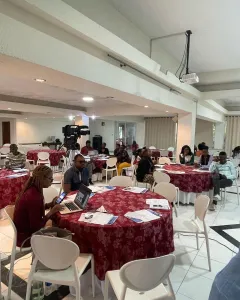Between October 2022 and January 2023, the Rooted in Trust project, implemented in Haiti by Internews, together with its partners including Panos Caraïbes and the cercle de réflexion sur le développement économique, carried out an assessment of the information ecosystem in Haiti, which sketched a portrait of the Haitian media and digital landscape that rarely focuses on disseminating information about the spread of numerous diseases in the country, particularly cholera and COVID-19.
According to Rooted in Trust, radio programs are largely dominated by politics and sports, while radio stations, television channels and online media are multiplying all the time.
Rooted in Trust’s assessment of Haiti’s information ecosystem enabled it to count some 700 radio stations and 150 TV channels in the country’s media landscape, not to mention the proliferation of online media. According to RiT, the number of internet users has risen from 31.1% in 2018 to 38.9% in 2023. That’s around 4.53 million internet users. 86.06% of these users connect via their cell phone.
Despite this increase, the media are unable to keep up with the information needs of their audiences, which can be seen as the impact of poverty on the country’s information ecosystem, putting them at a disadvantage when it comes to countering the spread of false information, rumors and misinformation.
While there is a proliferation of media in the Haitian digital system, the paper press is in full decline in Haiti. Since the socio-political crisis worsened, many companies have stopped advertising, which is the bedrock of the Haitian media’s business model.
According to the media panorama, there are two paper newspapers in Haiti: Le Nouvelliste and Le National.
Study participants claim not to use the paper press for information.
In Haiti, radio is still the most widely used channel for information, followed by friends and family, then religious places. While radio stations are not among the main sources of information in which participants have “absolute confidence”. They underlined the lack of professionalism and training of media personnel, as well as the clientelism that privileges access to information for certain media.
By way of recommendations, Rooted in Trust hopes that humanitarian actors will support community and national media in programming programs that can be used to share clear and accurate information, with an approach of proximity and social inclusion of all members of the community, giving them the opportunity to express their concerns and address topics relevant to their daily lives. An approach that can also help to broaden the current programming of the Haitian media, which focuses on politics and sport.
The official presentation ceremony for this assessment was held on Wednesday May 24 at the Hotel Montana.
It should be noted that the Rooted in Trust project is a pandemic information response program. The RiT2.0 project combats the scale and speed of the spread of rumors and misinformation. The project is being carried out in thirteen countries (Lebanon, Colombia, Haiti, Brazil, Mali, Sudan, Democratic Republic of Congo, South Sudan, Madagascar, Iraq and Afghanistan).
In Haiti, the Rooted in Trust team works, in French and Creole, on rumors relating to Covid-19, Cholera, the vaccine and other subjects linked to community perceptions of the humanitarian response in the country. Its work covers the departments of Ouest, Sud, Grand’Anse and Nord.








